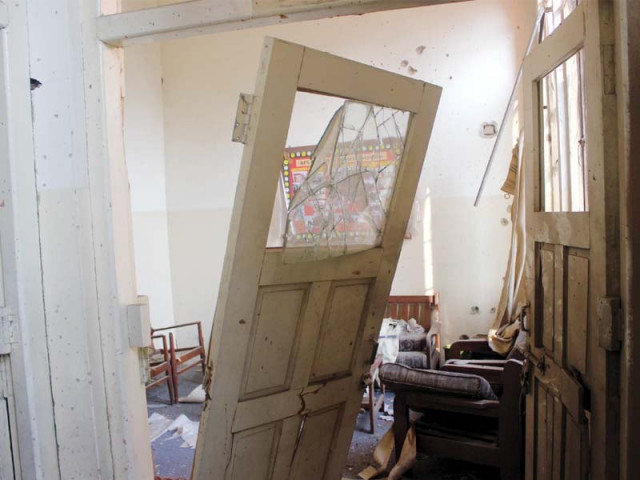The day I cried in the newsroom
“Khan jee, the Taliban have attacked the Army Public School," said a text message

An unforgettable image of the carnage.
I’m no exception.
I’ve been journalist for 15 years now. And I have covered many tumultuous events during all these years. Be it the apocalyptic earthquake of 2005 when tens of thousands of lives were lost, or the 2010 floods of biblical proportions when more than half of Pakistan was swamped or the 2013 twin suicide attacks on a Sunday mass at Peshawar’s All Saints Church that killed dozens – mostly women and children. Let me be honest, I never cried.
But then a day came when I did. December 16, 2014.
It was a chilly morning – both literally and figuratively. The sun was peeping in and out of the floating clouds. I had never thought that this day would be etched in my memory for ever. That it’ll continue to haunt and torment me – perhaps for the rest of my life. I was travelling back to Karachi after a brief official visit to Peshawar. I was to catch PIA’s only daily morning flight. I got up early to drop by my in-laws in the Cantt area en route to the airport.
I drove past the Army Public School. Casually looking out of the cab window, I saw young schoolchildren getting down from their vans at the school gate, some waving and blowing kisses to their parents who came to drop them, others shivering with cold in their green uniform coats. Never in my wildest imagination had I thought that some of these innocent faces the world would never see again. And none of them would have ever thought that death could stalk them so early.
But sadly it did.
I landed at Karachi airport at 11-ish. The plane was still taxiing to the jet bridge when I switched my cellphone back on. It bleeped with a text message. It was from my brother-in-law, Tahir. “Khan jee, the Taliban have attacked the Army Public School. We can hear gunshots and sporadic explosions,” he wrote. Some other passengers also got the news from their families in Peshawar. Soon the plane was abuzz. Everyone was cursing the Taliban, ‘the demons’.

When I reached home and tuned into a news channel, it turned out it was true. The Taliban had stooped to the lowest of the low. It was a willful massacre of schoolchildren. Television footage showed distraught parents, dazed children, wailing ambulances along with the sporadic sound of gunshots and small explosions. Taliban suicide bombers, armed with guns and grenades, were rampaging through the school, killing wantonly, not sparing anyone.
It was, in one word, sickening.
There is hardly any parallel in modern history to this gut-wrenching mass murder of schoolchildren by ruthless Taliban killers. Some analysts believe the 2004 Beslan school tragedy and the 2011 killing spree at a Norway youth summer camp by Andres Breivik bore close similarity to the bloody APS rampage.
I beg to differ.
At the school in Beslan, a town in the autonomous Russian region of North Ossetia, Chechen and Ingush militants had not come for willful killing of children. They were holding the pupils and their parents’ hostage to use them as a bargaining chip in negotiations with Russian authorities. And, according to some accounts, their booby-traps began to explode when Russian special forces stormed the compound. In all 385 people, among them 156 children, were killed.
About the Andres Breivik case, it was though a willful mass murder but by a lone wolf who was later diagnosed with a longstanding personality disorder. He first bombed government buildings in Oslo and then attacked the Labour Party youth camp on the island of Utoye. Of his 77 victims, 55 were teenagers.
In the APS case, the attack was planned, attackers especially trained and the target willfully chosen. The gunmen, wearing suicide vests, wanted to kill as many children as they could. They didn’t want to take them hostage to use them for negotiations with the government. They rampaged through the school compound, going from classroom to classroom and shooting pupils at will. In the hours-long orgy of bloodshed, 150-plus people – all but less than a dozen pupils were killed.
This was inarguably the most devastating day in my journalistic career. When I went to office that day and started planning for the next day’s edition, bone-chilling accounts of survivors and grisly images started trickling in. News channels were covering the tragedy as it was unfolding. Television blurting out disturbing footage, of distraught parents, of wailing ambulances ferrying the young casualties in their blood-soaked uniforms, of pickups carrying coffins to mortuaries, and of psychologically shattered survivors telling harrowing eyewitness accounts as the nation watched in disbelief and shock.
In the night, the military spokesman announced on Twitter that all terrorists involved in the attacked had been eliminated in an operation by special forces and that the bloody siege was over.
We were relieved, at least the macabre violence had ended. But an eerie silence filled our newsroom. A pall of gloom hung in the air. I could feel even nature was in mourning. I couldn’t hold back my tears. I cried – for the first in my career. And while vetting the story, I found myself at a loss for words to write a headline that could describe the enormity of the tragedy. I could only call it ‘Our Darkest Hour’.
Published in The Express Tribune, April 12th, 2015.


















COMMENTS
Comments are moderated and generally will be posted if they are on-topic and not abusive.
For more information, please see our Comments FAQ